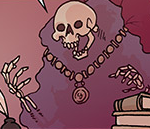|
I have an interesting problem. Our D&D group recently started up a campaign where the DM's girlfriend started DMing. Frankly, it's not fun. It's okay, but every session devolves into a three hour long combat session against superior enemies with little to no description. Every combat is a slugfest with the PCs barely scraping by each and every time. We don't accomplish much, or feel like we do and after some discussion one on one everyone in the group, save the DM and her boyfriend, is fed up. So how do we get out of it? If we say we're not having fun straight out and want to do something different we run the risk of hurting feelings. My solution at this point is to suicide our characters, refuse to reroll, and open the floor to a new (or old) campaign; but I'd like some advice. What do you do when your DM is inexperienced and their campaign isn't fun anymore?
|
|
|
|

|
| # ? May 9, 2024 20:19 |
|
How is "We're dying on purpose and not re-rolling because you suck" going to be less hurtful than "These fights are frustratingly long and too thin on plot, could you please change it up a little?"
|
|
|
|
You're gonna have to hurt some feelings, then. poo poo sandwich it - "we really like X, but <everything> sucks. Here's some tips to not suck so bad. If you just do that, everything will be as good as <good thing>!"
|
|
|
|
Really Pants posted:How is "We're dying on purpose and not re-rolling because you suck" going to be less hurtful than "These fights are frustratingly long and too thin on plot, could you please change it up a little?" Well for starters we're not planning on saying anything directly. Mostly because we have said that the fights are too drawn out and the campaign is way too combat-focused in the past and nothing has really come of it. We've told the DM this on more than one occasion. In most fights we scrape by on the skin of our teeth, everyone is on at least their second character and we've only been playing for a few months. We usually spend the latter half of an evening frustratingly trying to save our characters using every trick we have as they're getting the poo poo kicked out of them. Every loving week. Hell, even the DM has expressed her own frustration at the campaign, but the cause was pawned off on a number of other possible reasons instead of the much more likely "You don't have a lot of experience as a DM, and running a game with experienced players who want more than you're offering is perhaps beyond your ken."
|
|
|
|
Kumo posted:Mostly because we have said that the fights are too drawn out and the campaign is way too combat-focused in the past and nothing has really come of it. We've told the DM this on more than one occasion.
|
|
|
|
Yeah I don't think there's a magic trick for this. Probably just talking about it - that this game is so not fun that you don't want to play any more if it doesn't change - is going to be less hurtful than staging a mass PC suicide. If the deal is that she's learning to DM, could someone co-DM with her for a while, maybe work with her to incorporate more non-combat stuff into the campaign? Especially if she's frustrated maybe offering some help would be beneficial.
|
|
|
|
Yawgmoth's two posts are (combined) exactly what you should do. Confrontation is difficult, which is why people are attracted to other ways of resolving things, but it really is the way to go, even if there is no net difference in hurt feelings. Aside from the "poo poo sandwich", use "I" statements like "I'm not enjoying strings of absolutely brutal fights without much plot" and "I'm going to drop out of the campaign if it keeps going the way it's going". Be tactful but be firm and clear. The outcome may not change at all, but it cannot be worse than doing something hurtful as a "wake-up call" (suiciding characters and thereby voiding DM preparation time) divorced from your concerns.
|
|
|
|
Kumo posted:Well for starters we're not planning on saying anything directly. Mostly because we have said that the fights are too drawn out and the campaign is way too combat-focused in the past and nothing has really come of it. We've told the DM this on more than one occasion. In most fights we scrape by on the skin of our teeth, everyone is on at least their second character and we've only been playing for a few months. We usually spend the latter half of an evening frustratingly trying to save our characters using every trick we have as they're getting the poo poo kicked out of them. Every loving week. Listen to others' advice about being tactful and polite. You want to be assertive without being confrontational.
|
|
|
|
Quick bits of advice needed in the form of some rapid-fire questions: 1) Until now I've basically fudged along in terms of currency rewards and things. How solid are the treasure parcels + using the listed prices for items? I've just done it my way until now and its been fine, but I think I need to shift this now that I'm getting into a longer Paragon tier campaign. Is the official stuff serviceable? 2) EXP budgets and things - again, do these work? Does the official encounter building method of setting an EXP budget and "spending" it prove useful? I've always done a "level up every few sessions" mechanic which has worked well but again I want to try to make my campaigns more "official" in a sense, to try to take the burden off of myself 3) Inherent Bonuses + Boons - how do they work and are they better than magic items? Getting another headache managing things like "the fighter has +3 gear, the bard only has +2 gear, the mage has a +4 staff from a super skilful theft but only +1 robes as he's neglected to upgrade" etc. Are Inherent Bonuses better? Sorry if this is basic stuff, I've just got a big new campaign coming up in the summer (I run the major one for my University club) and wanted to just streamline things. The previous campaign was all new players, but they've now got 11 levels under their belts and I think I'm going to need to change my style.
|
|
|
|
Lord Twisted posted:Quick bits of advice needed in the form of some rapid-fire questions: 1 - I'm not too familiar with treasure parcels, but they are not regularly complained about. The major gripe about wealth is that the official system strongly disincentivizes the use of rituals and consumables, by drawing from the same pool of funding that could be used on permanent items with permanently accessible effects. There are a few homebrew suggestions to work around this if you want to make rituals more attractive. 2 - Level up every few sessions is actually something I prefer to XP budgets, but they do work, especially if you use Monster Vault/MM3 critters. 3 - Inherent Bonuses free you from the item treadmill and bring magic items back to being cool things that let you do cool stuff. Characters get their basic math fixes automaticall, getting built-in +X enhancement bonuses to hit, damage, and defenses that scale at fixed levels. That means that, for instance, you don't have to worry about the Mage's +1 robes -- the +3 inherent enhancement bonus overwrites it and you use that. Similarly, the +4 staff's enhancement bonus overwrites the inherent bonus and you use that instead. Boons are easy to write into the story, are flavorful, and grant interesting new abilities. Plus they fade out in a few levels, in time for you to replace them with some other cool thing.
|
|
|
|
That sounds solid then. I think I'll probably try to stick to the "official" economy and continue doing my own thing with EXP levelling up every so often, unless someone else speaks strongly in favour of official EXP budgets. Inherent bonuses sound like *just* what I need. I just want to give out magic items based on cool stuff rather than what characters "need" because of various imbalances within the party. In addition, are there any cool random generators people can recommend? I just need hooks for NPCs and stuff. The 3.5 edition DM book has a nice little table for rolling up personalities, but sometimes its fun to just hit the generate button on something like that a few times to see if anything appealing comes up.
|
|
|
|
Thanks for all of the advice. You're probably right that a direct conversation is a better way to go, but it's difficult to confront a well-meaning DM without hurting feelings. Also found this: http://www.livingdice.com/961/how-to-fire-a-bad-dungeon-master/ quote:The determination that a game group has a bad DM that needs replacement does not happen over night. It is usually the cumulative result of obvious, cliched plots (save the princess!,) poor table management (the last session ended with 2 hours of arguments about Star Wars vs Star Trek,) miserable presentation skills (the DM’s nickname is “mumbles,”) and criminally negligent rule interpretations.
|
|
|
|
Lord Twisted posted:That sounds solid then. I think I'll probably try to stick to the "official" economy and continue doing my own thing with EXP levelling up every so often, unless someone else speaks strongly in favour of official EXP budgets. The main 4E thread had a few posts recently with links to some amazing generators. I'd check the OP to see if they were added or glance around the last 5 pages or so. Barring that, chaoticshiny.com is one of the links and they have an amazing fuckton of generators there.
|
|
|
|
Kumo posted:Thanks for all of the advice. You're probably right that a direct conversation is a better way to go, but it's difficult to confront a well-meaning DM without hurting feelings. Well, there's no way it won't be a little difficult, but if you approach the talk from the angle of 'we want the game to be better' and not 'hey, you suck' it doesn't have to be awful. The article makes some interesting suggestions but I guess I disagree that just quietly starting another game or trying to manipulate them into being a player is a better strategy. I mean, presumably someone you've been gaming with is your friend. Just talk to your friend about what's going on. If they're completely unreceptive then you do what's necessary, but start out treating them with some respect and not trying some passive aggressive sleight of hand. I think most people would probably see through the tactic of tempting them with a cool new campaign tailored for their tastes as a player and just end up asking 'hey, uh, so I guess you didn't like me as a DM?' in the end anyway.
|
|
|
|
Lord Twisted posted:That sounds solid then. I think I'll probably try to stick to the "official" economy and continue doing my own thing with EXP levelling up every so often, unless someone else speaks strongly in favour of official EXP budgets. Even if you use the "level up when the story tells you" method (which you should as gently caress keeping track of experience levels), you should still use the EXP budgets for encounter design as they are a very good guideline.
|
|
|
|
Mr Beens posted:Even if you use the "level up when the story tells you" method (which you should as gently caress keeping track of experience levels), you should still use the EXP budgets for encounter design as they are a very good guideline. Keeping to the XP budget is a good idea as long as you don't forget the bit that says not to work in monsters more than 3 or 4 levels off the party. If you find a higher-level monster that might work within the current encounter's XP budget, consider reskinning it as an elite or perhaps even a solo of an appropriate level, though this will require coming up with extra powers.
|
|
|
|
So I was reading through the "worst gaming experience" thread and started reading 50 ft Ant's posts about his Ravenloft campaign. It seemed pretty cool, and I got to wondering about whether GM's sharing their campaign ideas is something that other people would be interested in doing in this thread. I imagine some may be willing, but others might not want to share their campaign ideas. The reason I'm considering it is this: typically the GM doesn't have likeminded peers to bounce ideas off of. You try something and your players may love it or hate it, and a lot of the time you have to cater to them; but you don't typically get to refine your campaign ideas by bouncing it off of other people. Since this is my idea, I'll go ahead and venture a few and see what you guys think. Tribute: In small kingdom nestled in a mountainous region of the continent, filled with craggy mountains, hidden glens, and lush, forbidding forests a shadow has fallen. Many years ago a cruel wizard/knight/lord/etc. took power using great and terrible arcane magics and rules to this day. As part of his annual tithe he demands the first-born children of each of the noble houses to accompany him into his inner sanctum to serve him, and none is ever seen again. The implication being that they are sacrificed to fuel the lord's magical means of control. As it happens, the son/daughter of the chosen house for this year has bargained for a time to see the world outside the kingdom and in so doing journeys in search of heroes valiant enough to save his realm. Desolation: It has been 80 years since the war. 80 years since the PC races garnered their strength, rose as one host and fought back against the demons/dimensional invaders/rival kingdom/generic bad guy army and lost wholly and completely. Those who survived either swore allegiance to the invaders, who raised them up to watch over their own kind; decimated their race so that only a scant few survived, or fled across the seas, or to their mountain holds and secluded forests. Blackest tyranny is the only rule of the land now, but all is not lost. Outlaws, prisoners, raiders, slaves, terrorists, rebels; kindle the sparks of rebellion. An insurrection is brewing and the PCs have their role to play as heroes of the revolution. The Stolen Egg: The PCs happen upon a wounded/dying/dead man with an egg in his possession. A large egg. What they do with it is up to them. Do they sell it? Try to determine what kind of egg it is? Try to figure out the identity of the man and how is it that this egg is in his possession? Is he a thief, did he find it himself, or was he protecting it from something worse? What happens when deranged cultists/mercenaries/etc. begin looking for the egg for their own purposes? What happens when the mother comes looking for it? What happens when it starts to hatch?
|
|
|
|
Can someone recommend me good programs/sites for generating world or area maps? I'm kicking around a campaign in my head but I'm horrible at making and drawing maps. Most of my google results have lead to things that seemed to be abandoned in the late 90s.
|
|
|
|
Darksaber posted:Can someone recommend me good programs/sites for generating world or area maps? I'm kicking around a campaign in my head but I'm horrible at making and drawing maps. Most of my google results have lead to things that seemed to be abandoned in the late 90s. I like Campaign Cartographer but it costs actual money.
|
|
|
|
I'm not adverse to things that cost actual money, but will CC actually generate a random landmass? I thought it was just for filling things in.
|
|
|
|
Kumo posted:So I was reading through the "worst gaming experience" thread and started reading 50 ft Ant's posts about his Ravenloft campaign. It seemed pretty cool, and I got to wondering about whether GM's sharing their campaign ideas is something that other people would be interested in doing in this thread. Good ideas, but they're probably better off in the "new game ideas" thread, which is full of stuff like this.
|
|
|
|
AlphaDog posted:Good ideas, but they're probably better off in the "new game ideas" thread, which is full of stuff like this. I did not know this existed. Thank you. And so this is more of a worthwhile post, how do you deal with a powergamer/rules lawyer when they're the only one in the party? I have one in our group, and he's a great gamer, but I cringe when I think about him obsessing over a system and skewing the rules to his advantage and to the detriment of the fun of the rest of the party.
|
|
|
|
Kumo posted:I did not know this existed. Thank you. No worries, it's an awesome thread  You could phrase it as asking him to pick a slightly flawed character because he's "the best" player. The guy who trades off GMing with me usually plays a flawed or non-optimised character in my games, because it lets him play at the same level as the other players who aren't into that sort of thing, which is more fun for everyone. I never had to ask him to do it, he realised that taking the spotlight the whole time would be detrimental to everyone else's fun, so he doesn't do it. (Although he easily could build something game wrecking, and so could I in his games. That's why we occasionally play Hackmaster, where that sort of thing is the whole point). Edit: Or flat out tell him not to bring up rules discussions during the game. If he has a problem with a GM decision, tell him to mention it as it happens, but then discuss it after the game, possibly without the other players around if they aren't interested in that sort of thing. That's worked for me in the past, but it's a little bit oldschool "GM IS ALWAYS RIGHT" for some groups.
|
|
|
|
Kumo posted:The reason I'm considering it is this: typically the GM doesn't have likeminded peers to bounce ideas off of. You try something and your players may love it or hate it, and a lot of the time you have to cater to them; but you don't typically get to refine your campaign ideas by bouncing it off of other people. Your players are people. People in a better position than most to judge whether your players will love or hate an idea, even. This belongs in this thread, because I am giving you advice.
|
|
|
|
Doc Hawkins posted:Your players are people. People in a better position than most to judge whether your players will love or hate an idea, even. It is also a LOOOOOT easier to run a campaign where everybody collaborated, in my opinion. It's an easy way to get plot hooks, and if everybody is super into it, it's a lot easier to just run a consistent game. I am running a campaign now where everybody collaborated. I gave a few systems I am familiar with, the group picked one they wanted, and we all started throwing out campaign ideas. One of my players suggested that the party be a band of travelling rock stars. Initially the enemy was going to be a cult dedicated to restoring the establish of the monarchy by eliminating their greatest threat: Rock & Roll. The Royal Imperial Association of Archmages didn't really grab the party, so now they are travelling and competing alongside a rival boy band. It's a lot of fun, and all the players gave really good suggestions for what they want out of this campaign. ( Unwelcome rock concerts at monasteries)
|
|
|
|
AlphaDog posted:Edit: Or flat out tell him not to bring up rules discussions during the game. If he has a problem with a GM decision, tell him to mention it as it happens, but then discuss it after the game, possibly without the other players around if they aren't interested in that sort of thing. That's worked for me in the past, but it's a little bit oldschool "GM IS ALWAYS RIGHT" for some groups. The way I always phrase this is not "GM IS ALWAYS RIGHT" but "perhaps you're right, but right now I would rather keep the combat flowing than interrupt the game with an argument, so we'll do it my way for now and after the session we can figure out who's right and then make sure we get things right in the future". Seems to work pretty well in general.
|
|
|
|
My players are planning to assassinate the head arcanist of an evil kingdom, and since these things are never easy, he's protected by three seals that need to be approached in certain ways. I've got two worked out; the third protects him from physical harm so I thought it'd be nice if the method to break it was to physically destroy it with a certain weapon. The thing is, I don't want this to be too easy ("oh, he kept the Sword of Sealbreaking in this locked cabinet right next to the seal, how handy"), but at the same time don't want to dwell on it for more than 30-60 minutes of playtime, if that. Any quick ideas?
|
|
|
|
Make it require a very light tap. The harder you hit it, the less damage it takes, and vice versa. Having the 8 str wizard (or equivalent) hit the seal with his hat shatters it immediately.
|
|
|
|
Excellent! Just the kind of thing I was looking for, thanks.
|
|
|
|
Depending how hard you want it to be to figure it out and/or how clever your players are, you could give them some visual clues to help them along. Like if the first thing they do is tap it with a hammer (too hard, but not by a great deal) it puts a ding in it. If they give it a harder whack maybe it puts a teeny scratch but no ding. If they then go up to a two handed smash with a mace it is completely unharmed.
|
|
|
|
Environment and flavor could go a long way here, too. The seal could be kept in a reliquary made of glass, but enchanted in the same way as the seal. Cautiously approaching the seal starts breaking everything around the players, risking a great collapse. Put various pressures on them like hidden archers or obvious but difficult to disarm traps that will make them move and interact with the environment in different ways which in turn will provide more clues to how to destroy the seal.
|
|
|
|
I am working on my first campaign as a DM, and I think I might need some thematic pointers (or total redirection). It is a d20 past adventure with a Victorian paranormal theme. I plan on doing it in short one session episodes, maybe once a month (as we have another game going on). We usually play really traditional 3.5 or Pathfinder dungeon crawl sort of adventures, but everyone seems interested in my paranormal idea. I was wondering if it would be worth it to attempt to make the adventure a horror one or if this is too difficult. So far my ideas for bringing the fear are; Low lights and ambient music: Our current DM is doing this, and I think it is a bit silly. Suspense: I think that maybe I could make the players think an encounter was around ever corner. Cut scene: I was contemplating killing a higher level NPC with a monster too difficult for them to handle, and having the monster escape, potentially lurking around each corner. The monster would have been summoned by an unseen villain, and the PCs would never interact with it. Dose this sound too difficult/silly? Has anyone ever run or played in a horror type campaign, if so what made it work? kitten princess fucked around with this message at 03:07 on Jun 23, 2011 |
|
|
|
Horror is a tricky thing to get right, you have to gently caress with the player's expectations without ruining the system. Really, the only horror I've seen work well is Dread (because you know you're going to fail eventually), and one game of CoC where I managed to make one player freak out completely, but that was sheer luck rather than any actual skill on my behalf (apparently, zombie children who sing nursery rhymes are a deep-seated fear of his, which I didn't know or I wouldn't have put them in). I really don't see d20 as being a great system for horror, because it's geared so much towards heroic adventures. You have the problem (that you have with all dice-based horror games in my opinion) of the players thinking "it's ok, I got this, I just need to roll 15+" instead of freaking out and running like hell away from the monster/ghost/zombie/whatever. I really don't know how to solve that one though. I do like your idea of a way-too-powerful monster, but my group would instantly see through that as "he'll never actually throw that at us". Since you're a newer DM it might work really well for you though, in that the players won't be so familiar with your style. Low lights and ambient music can be pretty cool, actually. We once played Dread with no lights in the house and it was gradually getting darker outside and starting to storm. It was atmospheric and awesome. That sort of thing can be really cheesy too though, depending on how people act about it. If you can actually make the players think that there's an encounter round every corner, that will build heaps of suspense, but it might be hard to pull it off well. I'd suggest weird noises, footsteps, doors slamming, and so on all described as you'd usually describe something important. You also run the risk of players assuming the environment is much too dangerous for them and just holing up in one room until morning (not that you couldn't run with that and still be scary, but it doesn't sound like what you're after).
|
|
|
|
I think low lighting turns out to be more annoying than anything, and although I have used music a couple times it can also just end up being a distraction. I don't think either does that much to set a mood. The thing with the monster the PCs are not supposed to fight is that it depends very much on your players. Certain players will fixate on it and make killing it their mission, and they'll be frustrated if they can't for whatever reason. Making players think something could happen at any time is great. That will do more to create tension with most groups than meticulously describing piles of intestines or whatever. You can sort of help that along by suddenly asking which hand their character is using to open a door, or something along those lines. Now they're wondering why that's important and thinking that something awful might be about to happen. You can describe innocuous things in suspicious ways to heighten that too. Like if they ask how big a chest at the foot of the bed is you can say that it looks big enough to hide a body in. I like to describe a lot of sounds and smells as well because so much description is usually done with visual information only; it seems to kind of stick with them a bit more.
|
|
|
|
I use a lot of imagery when I write horror and I hosed with my players' expectations just enough that they'd keep from turtling up and killing everything but would still be paranoid. Less pants making GBS threads fear and more them admitting to me in confidence that they had a nightmare or five about a few of my games. Man filled completely with ticks enveloping half of the party in a sneak attack? Check. KKK crucifies a man who they mercy kill (their fault) and they gently caress up the mercy kill and he becomes a recurring enemy? Check. Recurring them of crows throughout the entire campaign? I don't know how it ever scared anyone, but check. Mostly though I just didn't define what was happening. Here's the biggest thing about horror that you'll ever need to know. Tease the players, gently caress with their expectations, never fully reveal what's happening. Because if you define the big scary thing that happens it lets a person categorize what is happening. Better that you let the thing remain a mystery because their own minds make a thing far, far scarier than you will ever have the ability to do on your won.
|
|
|
|
Ice Phisherman posted:Here's the biggest thing about horror that you'll ever need to know. Tease the players, gently caress with their expectations, never fully reveal what's happening. Because if you define the big scary thing that happens it lets a person categorize what is happening. Better that you let the thing remain a mystery because their own minds make a thing far, far scarier than you will ever have the ability to do on your won. Oh god yes this. Especially if you're playing in an established system don't ever tell them flat out what a monster is, unless they're in a position where their characters should know. "It's big, it's hairy, it smells like death" is going to be much more intimidating than "it is the monster from page 82." I had a bunch of Shadowrun players really concerned about a basement full of horrible pale human-like creatures surrounded by chewed bones and decaying meat, to the point where they were just going to avoid it completely, until a veteran player realized they were ghouls and basically no tougher than ordinary people. Tension gone in an instant, curse him.
|
|
|
|
The trick to horror is suspense. People are playing a game, they know they're playing a game, and if you're doing horror where sacrifice will be required for victory then they're going to be prepared to lose a character. You have, and I mean HAVE, to work up the "things aren't what they seem" angle and make the players figure out what's going on piece by piece. If you know things that unnerve the players that's good to throw in (avoid big phobia's, though, you don't want a freak out at the table). At all costs, avoid cliches. Baby eating, slaughtering innocents in droves, that's comic book mustache twirling bad guy cliches just don't scare anyone. Make every death clearly have some sort of purpose but never just give the purpose out. Depending on your system (Dread is amazing for horror, suspense is literally built into the resolution mechanic) you may need to lean more on description than normal, which can bore hard core action seekers. If you have a group of action players, don't expect to scare or freak them out because they're most likely just looking forward to killing the monster when they finally track it down. I've run a great deal of CoC, and a basic horror investigate usually goes something like: Stage 1: Series of strange events - dogs disappearing, random black outs, strange vaguely remembered nightmares plague the more sensitive in the city, weird noises heard at night (the howling of long extinct wolves, the crying of a woman, the sound of metal being dragged along metal), etc. PC's get involved at this stage as people hearing rumors, those involved with police or PI might get directly involved in investigation, others should be interested enough to take it upon themselves to find out what's going on. Stage 2: People disappear. Could be hookers, hobo's, low lives that no one cares about. Maybe it's socialites, maybe it's a police investigator, maybe it's the slow kid who always bags the pc's groceries. Police related PC's, PI's, Newspaper men, adventurous types should be called in to look for the person. This stage can escalate to more disapperances. PC's should uncover multiple plausible rumors - strange people seen heading into the sewers/forest/caves, weird sounds coming from the abandoned house, something large heard moving inside the museum. Stage 3: Investigation - this is where things get interesting. Every rumor the PC's check out should be involved. Maybe the thing shambling in the museum is a centuries old mummy moving around, or a mammoth skeleton takes on a life of its own. The strange people match descriptions given of a coven of witches that were burned to death over 100 years ago, the abandoned house used to belong to an old rich guy with no family and an obsession with magic and the occult. Stage 4: the link - PC's should uncover the who/what is behind it all. Evidence points to a grand conspiracy of the city's richest members, a group of demon worshipers are back from the dead, strange creatures from beyond time and space wear the bodies of dead men like suits, whatever. Not spelled out in perfect terms, but enough that they have a good understanding of what's going on. At this point, they should recover the important person that went missing, alive or dead. Stage 5: the "showdown" - PC's head to where they expect to find whoever is responsible for the dark shenanigans. They should overcome their opponents, but uncover something even more insidious and dangerous - the cities elite disappear as they're gunned down, leaving behind black robes and a mask. An old film projector is turned on at the location - as each one dies, a shadowy figure appears in the film and smiles. The witches are once again dead, but they leave behind a warning that the things they served (or worked to keep imprisoned) will return now that they're dead. The body suits are destroyed, but as each one dies a strange colored light comes from its eyes and slowly fades away. Stage 6 - the Denouement - more evidence left behind should lead the characters to believe that they have only stalled something big and dangerous, not stopped it. They may face something decisively otherworldly at this point, like all the reels of old film where they faced down the elites animate as a giant monster, with previously unused film recording the battle frame by frame. A demonic cat, possibly a familiar, fights the party and leaves anyone it hits with a strange mark in a specific place, one of the body-suits was keeping a diary of its exploits, and it includes writing of an ancient city with weird lights below the sewers. The last entry details a set of pots with weird lights, and when they were opened hundreds of lights like those the pc's witnessed where seen to stream out into the darkness. The main trick is to build suspense with each stage, and for every victory to lead to a more dangerous solution, and to never let them have a complete and total victory until you're ready to end the campaign.
|
|
|
|
Hal Gill username posted:Oh god yes this. Especially if you're playing in an established system don't ever tell them flat out what a monster is, unless they're in a position where their characters should know. "It's big, it's hairy, it smells like death" is going to be much more intimidating than "it is the monster from page 82." Ghouls are very much tougher than the average person. They have roughly 7-9 Body per ghoul. Many use scrounged up blades and occasionally a smart one will use a shotgun or something like that. And when they smell food and are outnumbered, have them do a hunting cry. And in the distance, other hunting cries ring out from several other directions, eventually getting closer and closer each round. Shadowrun has been and always will be "stay the gently caress out of combat unless you act first and don't get overwhelmed".
|
|
|
|
kitten princess posted:a horror type campaign Well, horror as a genre can be done a number of ways, but principally it's about invoking and maintaining fear, and there are many ways to use fear as a GM. Two ways in particular come to mind: loving with the audience's expectations and sense of normalcy and slowly and steadily stripping away what they've come to rely upon. loving with the audience's expectations is so easy it's trite, as it relies upon surprise and the unexpected- the sweet old lady or the innocent child as a vessel for some malicious desire or power, scares and starts, disappearing/appearing bodies, etc. You can use viscera and the grotesque easily, but that does not necessarily mean that it will be used well. Some horrific things can be unsettling and terrible in their normalcy. The second one, which I'll just call stripping, is a longer job, and a bit more difficult to pull off but potentially much more rewarding. By way of explanation, think of memorable horror movies and ask yourself what the setting was? A remote arctic outpost, a space station or ship, an island, a summer camp in the woods, a cabin in the mountains, an office building, a cave, a ship at sea, the forest primeval; invariably the setting is important because it requires a particular type of setting to create the first level of stripping- isolation and a quality of autonomy. Isolation is important because it strips the first layer of normalcy away from the characters- that of being a part of a mutual society where individuals can rely on each other for aid, goods, services, help, etc. Another way to put it is that the characters know that no help is coming- they are on their own. However, the isolation isn't necessarily limited to mere geographic isolation- it can also mean a personal and practical isolation as often characters are a group of relative strangers and limited equipment with them. Next, you need to invoke fear. You can do this by introducing some sort of strangeness, a puzzle, a mystery, disappearances or as easy as not a body once you're finished setting the stage and introducing the players. Then, you need to keep raising the tension by adding more and more strangeness and loss, you can do this gradually or incrementally as it suits you. However, don't let the characters actually see the monster or Other; fear of the unknown is always a greater sum than a fear of a known. Eventually you ramp up the stripping- weapons fail, or are useless, or ineffective, the power goes out, oxygen begins to run out, the vessel back to civilization is destroyed, essentially technology fails the human characters. Technology is usually the first casualty. The second is typically shelter, as whatever barriers were erected to ward off the pursuing Other are breached (or sabotaged). So, the characters must run or fight, or both; and take flight away from the isolated place to a place of civilization. Invariably, their path is fraught with perils, and a final confrontation between the Other and the characters occurs, and the characters are left with their wits and strength to avail them. By way of example, think of the movie "Aliens," "Predator," "Event Horizon," "Pitch Black," or "Sunshine."
|
|
|
|

|
| # ? May 9, 2024 20:19 |
|
Kumo posted:Well, horror as a genre can be done a number of ways, but principally it's about invoking and maintaining fear, and there are many ways to use fear as a GM. Two ways in particular come to mind: loving with the audience's expectations and sense of normalcy and slowly and steadily stripping away what they've come to rely upon. I think this might be the best advice I've ever read for how to create horror I've ever read. This would apply to any kind of horror, whether you're writing a game, a book, or a movie.
|
|
|





































